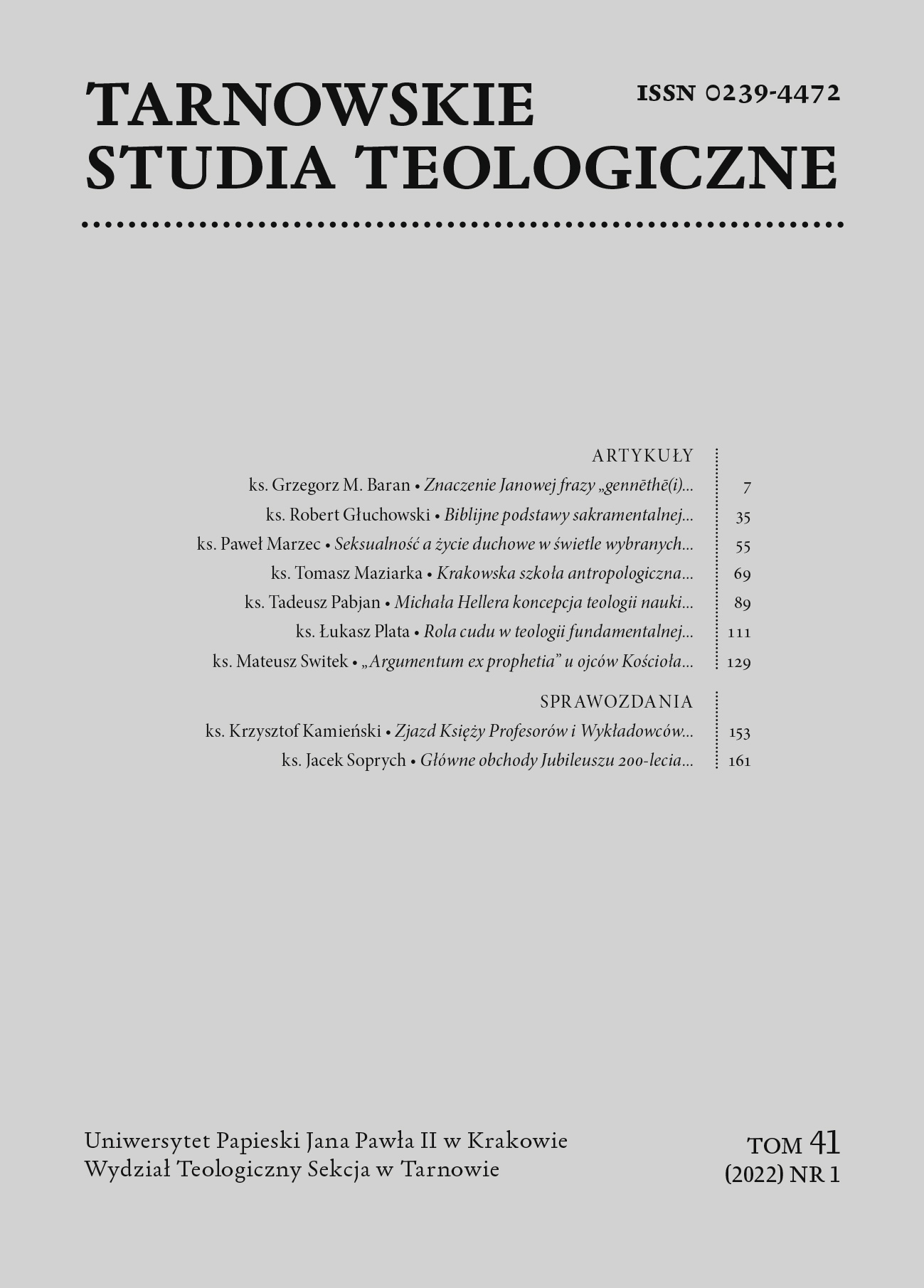Michała Hellera koncepcja teologii nauki
DOI:
https://doi.org/10.15633/tst.41105Słowa kluczowe:
teologia nauki, Michał HellerAbstrakt
Tematyka artykułu oscyluje wokół koncepcji teologii nauki zaproponowanej przez Michała Hellera. W ujęciu tego autora teologia nauki ma być nową dyscypliną teologiczną, która uczyni przedmiotem swoich analiz fakt istnienia nauk – w szczególności nauk przyrodniczych – oraz uzyskiwane w tych naukach wyniki. W pierwszej części artykułu omówiona zostanie sama idea teologii nauki. W zamyśle Hellera dyscyplina ta ma spoglądać na nauki przez pryzmat teologicznej prawdy o stworzeniu świata przez Boga. Problematyka stworzenia staje się w tym ujęciu punktem odniesienia dla analiz poświęconych teoriom naukowym, które mówią o początku świata i o ewolucyjnym początku życia biologicznego. Te i tym podobne zagadnienia, które mogą być przedmiotem zainteresowania teologii nauki, zostaną krótko omówione w dalszej części artykułu.
Bibliografia
Augustyn św., Komentarz słowny do Księgi Rodzaju, w: św. Augustyn, Pisma egzegetyczne przeciw manichejczykom, tłum. J. Sulowski, Warszawa 1980, s. 113–382 (Pisma Starochrześcijańskich Pisarzy, 25).
Barbour I. G., Ways of Relating Science and Theology, w: Physics, Philosophy and Theology: A Common Quest for Understanding, eds. R. J. Russell, W. R. Stoeger, G. V. Coyne, Vatican City State 1988, s. 21–48.
Dadaczyński J., O niektórych (możliwych) obszarach badań teologii nauki, w: Teologia nauki, red. J. Mączka, P. Urbańczyk, Kraków 2015, s. 75–94.
Edwards D., Bóg ewolucji. Teologia trynitarna, Kraków 2016.
Edwards D., Jak działa Bóg?, Kraków 2013.
Hawking S., Mlodinow L., Wielki Projekt, Warszawa 2015.
Heller M., A program for theology of science, w: Creative tension. Essays on science and religion, Philadelphia–London 2003, s. 29–32.
Heller M., Ewolucja kosmosu i kosmologii, Warszawa 1985.
Heller M., Filozofia i wszechświat, Kraków 2006.
Heller M., Filozofia przypadku. Kosmiczna fuga z preludium i codą, Kraków 2011.
Heller M., Nauka i teologia — niekoniecznie tylko na jednej planecie, Kraków 2019.
Heller M., Pabjan T., Stworzenie i początek wszechświata, Kraków 2013.
Heller M., Program teologii nauki, w: Nowa fizyka i nowa teologia, Tarnów 1992, s. 116–118.
Heller M., Stworzenie a ewolucja, „Communio” 2 (1982), s. 58–66.
Macek W. M., Teologia nauki według księdza Michała Hellera, Warszawa 2010.
Macek W. M., Teologia nauki, w: Oblicza racjonalności. Wokół myśli Michała Hellera, red. B. Bartosz, J. Mączka, W. P. Grygiel, M. L. Hohol, Kraków 2011, s. 203–237.
Pabjan T., Anatomia konfliktu. Pomiędzy nowym ateizmem a teologią nauki, Kraków 2016.
Pabjan T., Uwagi o teistycznej interpretacji zasady antropicznej, „Studia Philosophiae Christianae” 55 (2019) nr 1, s. 71–95.
Pedersen O., Konflikt czy symbioza? Z dziejów relacji między nauką a teologią, Tarnów 1997.
Polak P., Teologia nauki w perspektywie metodologicznej, w: Teologia nauki, red. J. Mączka, P. Urbańczyk, Kraków 2015, s. 25–56.
Tomasz z Akwinu, O wieczności świata, w: Tomasz z Akwinu, Dzieła wybrane, Warszawa 2001, s. 277–285.
Turek J., Komiczne koincydencje. Proponowane wyjaśnienia, Lublin 2014.
Życiński J., W poszukiwaniu teologii nauki, w: Nauka — religia — dzieje. II Seminarium Interdyscyplinarne w Castel Gandolfo, 6–9 września 1982 roku, red. J. A. Janik, P. Lenartowicz, Kraków 1984, s. 80–86.
Pobrania
Opublikowane
Numer
Dział
Licencja
Prawa autorskie (c) 2022 Tadeusz Pabjan

Utwór dostępny jest na licencji Creative Commons Uznanie autorstwa 4.0 Międzynarodowe.
Autorzy publikujący w czasopiśmie udzielają jego wydawcy zgody o następującej treści:
- Autor zachowuje autorskie prawa majątkowe do utworu, a jednocześnie udziela wydawcy czasopisma zgody na jego pierwszą publikację w wersji drukowanej i wersji online na licencji Creative Commons Uznanie autorstwa 4.0 Międzynarodowe oraz zgody na wykonywanie opracowań, w tym przekładów.
- Autor ma możliwość udzielania zgody niewyłącznej na opublikowanie utworu w wersji, która ukazała się w czasopiśmie (np. zamieszczenia go w repozytorium instytucjonalnym lub opublikowania w książce), wraz z informacją o jego pierwszej publikacji w czasopiśmie.
- Autor może umieścić swój utwór online (np. w repozytorium instytucjonalnym lub na swojej stronie internetowej) jeszcze przed zgłoszeniem utworu do czasopisma.

